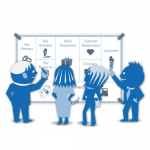Why Do So Many ERP Implementations Fail?
Obviously failure is the last thing anyone involved with an Enterprise Resource Planning (ERP) implementation wants, but dealing with a ‘bad project’ is exactly where many organizations find themselves at some point. However, failure doesn’t just happen all at once; it manifests itself in different forms all along the project timeline.
According to CIO Magazine, it is estimated that up to 10 billion Euros (13.3 billion US dollars) are lost every year due to project errors that can lead to a failed project. Those errors are often caused by unrealistic objectives and/or overly aggressive timelines. The most common errors and the percent that each error contributes to a failed ERP project are listed below:
- Project objectives are not clearly defined (71%)
- Unrealistic timing (61%)
- Lack of coordination of all parties involved in the project (55%)
- Wrong or inconsistent communication within the company (45%)
- Too much strain put on Project Managers (44%)
- Unrealistic budget (43%)
- Inaccurate detailed planning (41%)
- Complexity of the project is underestimated (39%)
- Reporting does not work smoothly (36%)
- Project cockpit from which the project is controlled is missing (36%)
What Does this Mean for Small to Mid-size Enterprises (SMEs)?
There are a number of advantages that SMEs have in the ERP marketplace today. Whether they are looking to purchase a system for the first time or need to replace an outdated system, the ERP product offerings today are more powerful and affordable than ever before. However, it is critical for a SME to select a product that is an excellent fit for their business and a System Integrator with industry expertise to oversee the project.
Selecting the Right ERP System and Integrator
Of course, there are two essential prerequisites prior to starting an ERP implementation project. First, the right ERP system must be selected; one that is flexible, versatile and future-proof. The selected ERP system should meet your functional requirements, fit within a realistic budget and offer a seamless upgrade process.
Second, a qualified System Integrator must be chosen. The ERP System Integrator should understand your business, have a proven methodology to implement the software and focus on excellent customer service to drive the project all the way to a successful go-live.
A Global Implementation Methodology (GIM)
A GIM is built upon four strategic pillars:
- Focus on the customer’s business
- Provide a short implementation cycle
- Stay on budget and on schedule
- Ensure predictable and repeatable results
These strategic pillars are essential to a Global Implementation Methodology because they address the most basic needs of all customers.
Republished with permission from ABAS.
About ABAS
ABAS provides growing companies with a wide range of out-of-the-box functional ERP systems. ABAS can readily be adapted to meet industry or company-specific requirements without impacting the standard functions or limiting up-gradability. ABAS promotes business success with a wide range of features and functions that reduce cycle time while increasing your productivity and competitiveness. Based in Karlsruhe, Germany, ABAS has partners in Europe, the Middle & Far East, Asia, Australia and the US.









